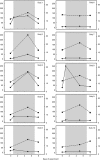Inositol for the prevention of neural tube defects: a pilot randomised controlled trial
- PMID: 26847388
- PMCID: PMC4825100
- DOI: 10.1017/S0007114515005322
Inositol for the prevention of neural tube defects: a pilot randomised controlled trial
Erratum in
-
Inositol for prevention of neural tube defects: a pilot randomised controlled trial - CORRIGENDUM.Br J Nutr. 2016 May;115(9):1697. doi: 10.1017/S0007114516000659. Epub 2016 Feb 26. Br J Nutr. 2016. PMID: 26917444 Free PMC article.
Abstract
Although peri-conceptional folic acid (FA) supplementation can prevent a proportion of neural tube defects (NTD), there is increasing evidence that many NTD are FA non-responsive. The vitamin-like molecule inositol may offer a novel approach to preventing FA-non-responsive NTD. Inositol prevented NTD in a genetic mouse model, and was well tolerated by women in a small study of NTD recurrence. In the present study, we report the Prevention of Neural Tube Defects by Inositol (PONTI) pilot study designed to gain further experience of inositol usage in human pregnancy as a preliminary trial to a future large-scale controlled trial to evaluate efficacy of inositol in NTD prevention. Study subjects were UK women with a previous NTD pregnancy who planned to become pregnant again. Of 117 women who made contact, ninety-nine proved eligible and forty-seven agreed to be randomised (double-blind) to peri-conceptional supplementation with inositol plus FA or placebo plus FA. In total, thirty-three randomised pregnancies produced one NTD recurrence in the placebo plus FA group (n 19) and no recurrences in the inositol plus FA group (n 14). Of fifty-two women who declined randomisation, the peri-conceptional supplementation regimen and outcomes of twenty-two further pregnancies were documented. Two NTD recurred, both in women who took only FA in their next pregnancy. No adverse pregnancy events were associated with inositol supplementation. The findings of the PONTI pilot study encourage a large-scale controlled trial of inositol for NTD prevention, but indicate the need for a careful study design in view of the unwillingness of many high-risk women to be randomised.
Keywords: FA folic acid; Folic acid supplementation; Inositol; MRC Medical Research Council; NTD neural tube defects; Neural tube defects; PONTI Prevention of Neural Tube Defects by Inositol; Pregnancy supplements.
Figures


 , Study group (inositol+folic acid (FA));
, Study group (inositol+folic acid (FA));  , control group (placebo+FA).
, control group (placebo+FA).
 , inositol concentration µ
, inositol concentration µ , inositol concentration in blood (µ
, inositol concentration in blood (µ ). Urine was obtained on the day preceding the start of dosing (day 0), on days 1 and 5 of dosing (in each case 3–8 h after taking inositol) and on day 8 when 24 h had elapsed since the final dose. Blood samples were obtained at these same times on days 0, 5 and 8. Note the relatively uniform blood inositol concentration response of subjects to the dosing, whereas urinary excretion of inositol is highly variable between individuals. For example, Subj 1, 3 and 8 show marked (3–5-fold) increases in urinary inositol after dosing, whereas Subj 5, 6, 7, 9 and 10 show almost no increase in inositol excretion.
). Urine was obtained on the day preceding the start of dosing (day 0), on days 1 and 5 of dosing (in each case 3–8 h after taking inositol) and on day 8 when 24 h had elapsed since the final dose. Blood samples were obtained at these same times on days 0, 5 and 8. Note the relatively uniform blood inositol concentration response of subjects to the dosing, whereas urinary excretion of inositol is highly variable between individuals. For example, Subj 1, 3 and 8 show marked (3–5-fold) increases in urinary inositol after dosing, whereas Subj 5, 6, 7, 9 and 10 show almost no increase in inositol excretion.References
-
- Medical Research Council Vitamin Study Research Group (1991) Prevention of neural tube defects: results of the Medical Research Council Vitamin Study. Lancet 338, 131–137. - PubMed
-
- Osterhues A, Ali NS & Michels KB (2013) The role of folic acid fortification in neural tube defects: a review. Crit Rev Food Sci Nutr 53, 1180–1190. - PubMed
-
- Tinker SC, Hamner HC, Qi YP, et al. (2015) U.S. women of childbearing age who are at possible increased risk of a neural tube defect-affected pregnancy due to suboptimal red blood cell folate concentrations, National Health and Nutrition Examination Survey 2007 to 2012. Birth Defects Res A Clin Mol Teratol 103, 517–526. - PMC - PubMed
Publication types
MeSH terms
Substances
Grants and funding
LinkOut - more resources
Full Text Sources
Other Literature Sources
Medical

